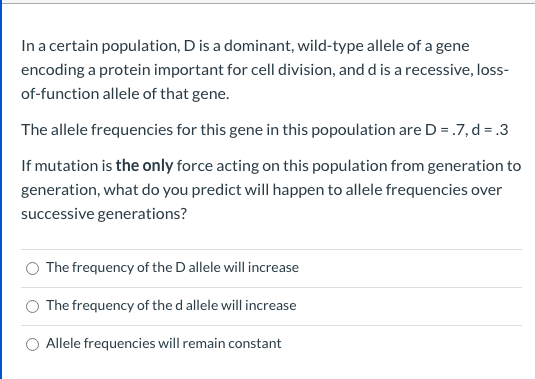In a certain population, D is a dominant, wild-type allele of a gene encoding a protein important for cell division, and d is a recessive, loss- of-function allele of that gene. The allele frequencies for this gene in this popoulation are D = .7,d = .3 If mutation is the only force acting on this population from generation to generation, what do you predict will happen to allele frequencies over successive generations? The frequency of the D allele will increase The frequency of the d allele will increase Allele frequencies will remain constant
In a certain population, D is a dominant, wild-type allele of a gene encoding a protein important for cell division, and d is a recessive, loss- of-function allele of that gene. The allele frequencies for this gene in this popoulation are D = .7,d = .3 If mutation is the only force acting on this population from generation to generation, what do you predict will happen to allele frequencies over successive generations? The frequency of the D allele will increase The frequency of the d allele will increase Allele frequencies will remain constant
Biology: The Dynamic Science (MindTap Course List)
4th Edition
ISBN:9781305389892
Author:Peter J. Russell, Paul E. Hertz, Beverly McMillan
Publisher:Peter J. Russell, Paul E. Hertz, Beverly McMillan
Chapter21: Microevolution: Genetic Changes Within Populations
Section: Chapter Questions
Problem 1TYK: The reason spontaneous mutations do not have an immediate effect on allele frequencies in a large...
Related questions
Question
PLease help, double and triple check your answers, im using this to study, these questions are NOT graded they are PRACTICE problems

Transcribed Image Text:In a certain population, D is a dominant, wild-type allele of a gene
encoding a protein important for cell division, and d is a recessive, loss-
of-function allele of that gene.
The allele frequencies for this gene in this popoulation are D = .7,d = .3
If mutation is the only force acting on this population from generation to
generation, what do you predict will happen to allele frequencies over
successive generations?
The frequency of the D allele will increase
The frequency of the d allele will increase
Allele frequencies will remain constant
Expert Solution
This question has been solved!
Explore an expertly crafted, step-by-step solution for a thorough understanding of key concepts.
Step by step
Solved in 3 steps

Knowledge Booster
Learn more about
Need a deep-dive on the concept behind this application? Look no further. Learn more about this topic, biology and related others by exploring similar questions and additional content below.Recommended textbooks for you

Biology: The Dynamic Science (MindTap Course List)
Biology
ISBN:
9781305389892
Author:
Peter J. Russell, Paul E. Hertz, Beverly McMillan
Publisher:
Cengage Learning

Biology: The Dynamic Science (MindTap Course List)
Biology
ISBN:
9781305389892
Author:
Peter J. Russell, Paul E. Hertz, Beverly McMillan
Publisher:
Cengage Learning